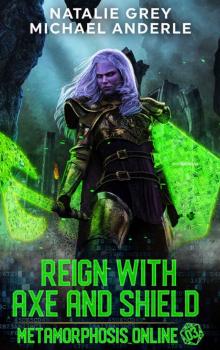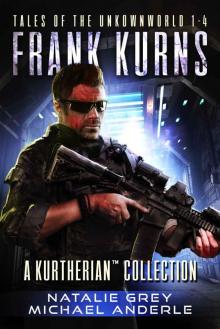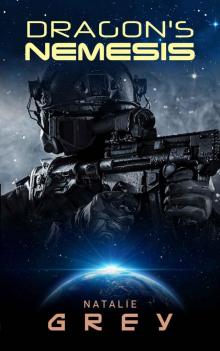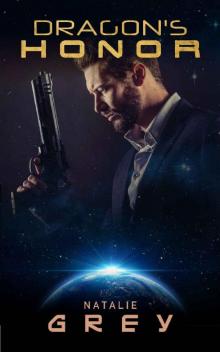- Home
- Natalie Grey
Vigilante
Vigilante Read online
Vigilante
The Vigilante Chronicles Book One
Natalie Grey
Michael Anderle
Vigilante (this book) is a work of fiction.
All of the characters, organizations, and events portrayed in this novel are either products of the author’s imagination or are used fictitiously. Sometimes both.
Copyright © 2018 Natalie Grey and Michael Anderle
Cover by Jeff Brown, http://jeffbrowngraphics.com/
Cover copyright © LMBPN Publishing
LMBPN Publishing supports the right to free expression and the value of copyright. The purpose of copyright is to encourage writers and artists to produce the creative works that enrich our culture.
The distribution of this book without permission is a theft of the author’s intellectual property. If you would like permission to use material from the book (other than for review purposes), please contact [email protected]. Thank you for your support of the author’s rights.
LMBPN Publishing
PMB 196, 2540 South Maryland Pkwy
Las Vegas, NV 89109
First US edition, May 2018
The Kurtherian Gambit (and what happens within / characters / situations / worlds) are copyright © 2015-2018 by Michael T. Anderle and LMBPN Publishing.
Contents
Chapter 1
Chapter 2
Chapter 3
Chapter 4
Chapter 5
Chapter 6
Chapter 7
Chapter 8
Chapter 9
Chapter 10
Chapter 11
Chapter 12
Chapter 13
Chapter 14
Chapter 15
Chapter 16
Chapter 17
Chapter 18
Chapter 19
Chapter 20
Chapter 21
Chapter 22
Chapter 23
Chapter 24
Chapter 25
Author’s Notes - Natalie Grey
Author Notes - Michael Anderle
Books by Natalie Grey
Books by Michael Anderle
Connect with the authors
Vigilante Team
Thanks to the JIT Readers
Daniel Weigert
Kim Boyer
James Caplan
Kelly O’Donnell
John Ashmore
Michael Pendergrass
Peter Manis
Micky Cocker
Larry Omans
Paul Westman
If We’ve missed anyone, please let us know!
Editor
Lynne Stiegler
From Natalie
For M and T
From Michael
To Family, Friends and
Those Who Love
To Read.
May We All Enjoy Grace
To Live The Life We Are
Called.
1
Tethra, one of the smaller cities on the planet High Tortuga, formerly known as “Devon,” was a surprising amalgam of smells and commotion. Barnabas wove through the crowds, oblivious to the brightly-colored awnings and the street vendors’ wares. He did not need to see the unique weave on the baskets or how a cook loaded spiced meat and vegetables into a pocket of bread.
He had seen plenty of cities in his day, and by this time he was no longer concerned with what they looked like. It was all about what they felt like. A planet’s cities were the bellwethers of its success...or failure.
And Barnabas wanted to see High Tortuga thrive.
Why he had started here he was not sure. He could have gone to H’onu, the capital… such as it was. On a whim, however, he’d come here when he left the Shinigami. Tethra lay on another continent, one the AI had told him was marbled with ore deposits lying under a variety of terrain from gorgeous snow-capped mountains to jewel-like oases between the dunes of the northern deserts.
For some reason, however, the original inhabitants of Tethra had decided to build it squarely in the middle of what might charitably be called a marsh, or, more accurately, a swamp.
It was full of reeds and it stank, and Barnabas was fairly sure there was some alien version of mosquitoes flying around. They weren’t as bad as mosquitoes on Earth—what was?—but they were no fun. Even with his reflexes, he had managed to hit himself once or twice trying to get one.
Whenever he did that he was fairly sure he heard Shinigami snickering in his head.
He spoke to her in his head as he walked so as not to attract the attention of the populace. You know, in my day—
Before humans figured out how to make fire, you mean?
Barnabas’s face settled into a frown. He did not like rude people. Well, except maybe Tabitha, known to the inhabitants of High Tortuga and other former Empire citizens and enemies as “Ranger Two.” Come to think of it, he wasn’t even sure why he did put up with her.
In my day, he continued after a moment, we raised the grain and herbs to brew our own beer and bake our own bread. We sewed our own clothes. We didn’t rely on technology.
Shinigami paused, which meant she was trying to calculate what he meant. He enjoyed the fact that she wasn’t sure yet.
Is it your opinion that the inhabitants of this planet use too much technology, Grandpa?
Barnabas stopped and directed a glare skyward. Did Tabitha stow away on the ship?
No. Why do you ask?
It’s the only thing that explains your attitude—that she’s there egging you on. Barnabas linked his hands behind his back and strolled onward, passing a group who appeared to be primates of some sort. The spray of hair on their faces looked somewhat like that of a marmoset, but their coloring was a deep rich brown with a hint of dark red.
In addition to the pseudo-marmosets, he saw some beings who looked like slugs, and a tall, reedy looking species with green-tinted skin and black double-pupiled eyes that had no whites. They seemed to move along the edges of the streets, never wading into the crush.
So, why did you mention the technology? Shinigami asked.
Oh, now you’re curious?
You left me floating up here. I’m bored.
There’s only so much you could do down here.
There are a lot of things I could do. I have guided missiles. I have a flamethrower. I’m exceptionally maneuverable, even in an atmosphere—
You have a flamethrower?
There was a pause.
Shinigami! You have a flamethrower? Barnabas kept his mental voice quiet and calm.
He was very, very good at not losing his temper. He had in fact vowed never to lose his temper again. It was the only reason he allowed himself on-world anymore.
Maybe, the AI admitted. I think Jean Dukes built it on a dare.
Barnabas considered this. He was not sure whether he believed Shinigami, but—disturbingly—it did sound like the sort of thing the weapons people on the Meredith Reynolds would have done.
What do you mean, you think?
Well, I mean I heard them talking about installing something, and now I have a switch I could turn on to see what it does. In fact, let’s try now.
No, no! Barnabas actually waved a hand in the air, earning himself some odd looks. No. Let’s not. We’ll talk about this later.
Why later?
Because right now, Barnabas told the AI with quiet satisfaction, I’m going to go get a drink.
He had seen a lot of cities in his day, and one thing never changed.
There was always somewhere to get a drink.
Venfaldri Gar settled down on a stool at the bar and tried not to frown too obviously.
Normally, he would not even think of coming to a place as grimy and rundown as this, but
he needed information and a seedy bar was the surest place to get it.
He winced when the bartender came into sight. She was an Ubuara. The sprays of white hair on her cheeks marked her as a female, and his sensitive eyes could pick up a faint brindled pattern in her sleek coat.
The Ubuara were partially hive-minded; each had their own thoughts, and yet absorbed some of their group’s thoughts in a very particular way. They could pass information to one another without speaking, and not simply words but also emotions and images. They had been observed absorbing each other’s thoughts and making those thoughts their own, although they had also been known to act individually.
Only the Ubuara seemed to understand when either thing—group integration or independent action—might happen. There was an Ubuara language, half hand signals and half words, but it was rarely used—at least not out loud. They tended to speak to each other mentally and learn the local language wherever they ended up in their travels.
Gar did not like Ubuara. No business owner in their right mind did, especially not an overseer of Devon’s mining industry. You could cut off their connection to the rest with a simple implant that transmitted a blocking signal—and of course, the cost of the implant was added to the worker’s contract, to be paid off with a few extra months of work.
But maintaining the transmitters was simply One More Thing To Do… and the Ubuara tended to overreact when they were cut off from the rest of the group.
It was just for a year. You would think they would understand.
It was a business owner’s nightmare, and Gar had long been of the opinion that Ubuara weren’t worth the trouble. He wasn’t in charge of staffing, though, and given that they tended to start insurrections if you didn’t cut them off from one another, they had to be dealt with somehow.
The Ubuara swung over to him using a series of holds on the ceiling and tilted her head toward him.
“May I get you a drink, sir?”
“Fruit juice, whatever you have.” Gar hesitated only a moment before adding, “Please.”
“At once, sir.”
She swung away, seeming pleased by the order. He had chosen it with care. The Ubuara enjoyed fruit juice, and he wanted her to think well of him. He didn’t want every free Ubuara on the street to know who he was and keep him from getting the information he needed.
Namely, what was that damned ship that had just appeared in orbit? The last time a strange ship had appeared, the mines had been shut down the next day.
Or at least most of them had.
Gar hunkered down to try to make himself appear as short and wide as he could. For a Luvendi he was noteworthy. Tall and pale, his eyes had double pupils that were ringed with bright blue-green. Although unusual simply because of his appearance, he was also distinctive because so many of the mine overseers had been Luvendi.
That was why he was afraid the bartender might not like him. There was really only one way people got to this planet, and Gar was not foolish enough to believe that people enjoyed working in the mines.
He wasn’t cruel, of course. He was only the vice-overseer, an assistant of sorts to Venfirdri Lan, who had once run many mines on Devon. Lan was cruel, and Gar always did his best to intervene when Lan’s actions might result in an uprising.
A medium-sized bipedal alien entered as Gar was given his fruit juice, and Gar looked at it curiously. He hadn’t seen this species before. It had a pinkish cast to its skin, eyes with a ring of color around the single pupil, and hands with no claws.
Gar gave it a once-over and pitied whatever overseer had drawn the short straw and gotten this one as a worker. It didn’t look very strong. Not interesting at all.
He scanned the bar and settled his attention on a group of Nekubi in the corner, their thick tails drawn under them to form makeshift seats. What were they talking about? Did they know about the strange ship?
Venfaldri Gar, of all people.
Aebura swung away from him with relief. He didn’t seem to have recognized her, which was probably a good thing. Gar had never been as cruel as Lan, but she wasn’t foolish enough to believe that Gar actually cared about the workers in their mine.
She had ended her contract two years ago and come to Tethra to wait for the friends she had made in the mines, starting her business in the interim.
She had believed that they would be along within a few months, so she’d held out on hiring help at first. She worked herself ragged to serve everyone herself, make the fruit juices, stock the back room, and clean the place.
But the months passed and no one had come.
She began to hear stories from the people who had left other mines, although they used the word “escaped.” They told her that sometimes the overseers didn’t like to let people go. Sometimes they added months to a contract for things like medical care to make it seem legitimate, but most of the time they didn’t even pretend.
She had been angry. She had spoken with the other Ubuara in the city, learning their stories and about the mines they had worked in. She had found out that although Lan was the cruelest person she’d ever met, he wasn’t bad as far as overseers went.
Then word had come recently that the mining corporation had been bought out and everyone was being freed. The contracts were terminated. The mines were closed down and would be reopened as legitimate businesses, with the workers receiving wages.
And still her friends had not arrived. Not a single one of them, over the years, had come to find her.
Aebura had kept collecting information, and she had noticed something very interesting—not one person she had spoken to had come out of Venfirdri Lan’s mine.
It was possible she had just missed them. She knew that.
But she did not think so.
And so now she struggled with the idea of speaking to Gar about it. He would surely know the answer, but old habits died hard—like the one about not annoying the overseers. If he hadn’t remembered her, her instincts told her she should keep it that way.
She swung over to a new patron. Lost in her thoughts, she hadn’t seen this one enter. She had seen one or two aliens like this before, just a glimpse on the street, and she understood enough about the species to know this one was male. Oemuga, an Ubuara who had traveled to H’onu, said there were many humans there now. Aebura was curious to find out more about them. She supposed not many had a reason to come to a place as small and out of the way as Tethra.
“What can I get for you?”
He hesitated, then spoke with a slight accent. “What would you suggest?”
“I have fruit juice,” Aebura offered. “All kinds.”
His nose twitched slightly and the corners of his mouth moved, but she did not know what that meant in this species. He seemed to consider for a moment.
“Whatever kind you recommend,” he told her finally. “Unless you have beer?”
“Beer?” She did not know that word.
He gave a very faint sigh. “I did not expect it. Fruit juice, then.”
When she returned, the glass held steady by her back feet while she swung over to him, he looked up at her pleasantly.
“What’s your name?”
“Aebura.” She smiled. It wasn’t unusual for patrons to want to talk, but usually they did that after weeks of coming in. “Who are you?”
“My name is Barnabas.” His voice was nice, she decided. It was very smooth; easy on the ears. “I am new here. Tell me about this place.”
“It is a very different place than it was a few months ago,” Aebura told him. She found a rag and began to wipe glasses dry, still hanging by one arm as she did so. “The mines were all closed down. Most of them, anyway.”
She hardly noticed it at the time, but her eyes drifted to Venfaldri Gar.
The alien noticed, though. He leaned forward, his eyes intent, and uttered only two words.
“Tell me.”
2
The strange thing, Aebura thought later, was that she had told him everything w
ithout hesitation. There was something about him. He wasn’t as tall as the Luvendi, nor did he have claws or sharp teeth or the sheer brute strength of the Brakalons.
But he had a commanding presence. When he spoke, you wanted to do what he told you.
So she told him the whole story, from her first days on Devon to the work in the mines to Lan and Gar and the rest of them. She explained how she’d been one of the first employed in Sector XVIII’s Mine 2b—and therefore one of the first to leave—and how she had nearly forgotten the touch of the group mind by the time she was released.
She told him how she had waited and waited.
To her surprise, instead of offering her a platitude he considered her story in silence for a long time.
“Tell me about your contract,” he suggested finally.
“You want to see it? I have a copy.” She’d kept it secreted away the whole time she was on the transport and in the mines.
Only now did she realize that she must have known on some level what kind of people they would be working for. Why would she have kept the contract unless she knew they would try to weasel and cheat their way out of it?
“Yes, please,” the human requested politely. “I would love to see it. And if it’s not too much trouble, I’d like another glass of this fruit juice. It’s excellent.”

 Reign With Axe And Shield: A Gamelit Fantasy RPG Novel (Metamorphosis Online Book 3)
Reign With Axe And Shield: A Gamelit Fantasy RPG Novel (Metamorphosis Online Book 3) Metamorphosis Online Complete Series Boxed Set; A Gamelit Fantasy RGP Novel: You Need A Bigger Sword, The New Queen Rises, Reign With Axe & Shield
Metamorphosis Online Complete Series Boxed Set; A Gamelit Fantasy RGP Novel: You Need A Bigger Sword, The New Queen Rises, Reign With Axe & Shield Frank Kurns Boxed Set
Frank Kurns Boxed Set Justiciar (The Vigilante Chronicles Book 5)
Justiciar (The Vigilante Chronicles Book 5) Protector (The Vigilante Chronicles Book 7)
Protector (The Vigilante Chronicles Book 7) Justiciar
Justiciar Defender (The Vigilante Chronicles Book 6)
Defender (The Vigilante Chronicles Book 6) The Vigilante Chronicles Omnibus
The Vigilante Chronicles Omnibus Dragon's Revenge (The Dragon Corps Book 4)
Dragon's Revenge (The Dragon Corps Book 4) Risk Be Damned
Risk Be Damned Challenges
Challenges The Dragon Corps
The Dragon Corps The Vigilante Chronicles Boxed Set 1
The Vigilante Chronicles Boxed Set 1 BELLATRIX (Frank Kurns Stories of the UnknownWorld Book 3)
BELLATRIX (Frank Kurns Stories of the UnknownWorld Book 3) Warden
Warden Dragon's Hope (The Dragon Corps Book 3)
Dragon's Hope (The Dragon Corps Book 3) Risk Be Damned: A Kurtherian Gambit Series (Trials And Tribulations Book 1)
Risk Be Damned: A Kurtherian Gambit Series (Trials And Tribulations Book 1) Dragon's Promise (The Dragon Corps Book 5)
Dragon's Promise (The Dragon Corps Book 5) Dragon's Nemesis (The Dragon Corps Book 7)
Dragon's Nemesis (The Dragon Corps Book 7) To Hell And Back_A Kurtherian Gambit Series
To Hell And Back_A Kurtherian Gambit Series Paladin
Paladin Blood Sorcery (Shadows of Magic Book 2)
Blood Sorcery (Shadows of Magic Book 2) Bright Sorcery
Bright Sorcery Vigilante
Vigilante Dragon's Honor
Dragon's Honor Challenges (Frank Kurns Stories of the UnknownWorld Book 4)
Challenges (Frank Kurns Stories of the UnknownWorld Book 4) Damned Into Hell
Damned Into Hell Paladin (The Vigilante Chronicles Book 4)
Paladin (The Vigilante Chronicles Book 4) BELLATRIX
BELLATRIX Dragon's Promise
Dragon's Promise To Hell And Back: A Kurtherian Gambit Series (Trials And Tribulations Book 3)
To Hell And Back: A Kurtherian Gambit Series (Trials And Tribulations Book 3) Dragon's Echo
Dragon's Echo Bound Sorcery: A Shadows of Magic Book
Bound Sorcery: A Shadows of Magic Book Sentinel
Sentinel Damned Into Hell: A Kurtherian Gambit Series (Trials And Tribulations Book 2)
Damned Into Hell: A Kurtherian Gambit Series (Trials And Tribulations Book 2) Dragon's Revenge
Dragon's Revenge